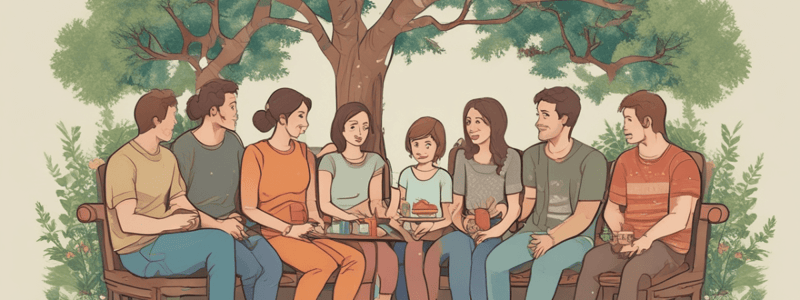Podcast
Questions and Answers
What is a useful strategy for maintaining a healthy relationship with a parent or guardian?
What is a useful strategy for maintaining a healthy relationship with a parent or guardian?
- Always agreeing with them
- Spending as little time as possible together
- Avoiding conflicts at all costs
- Having open and respectful communication (correct)
Which of the following is an example of sibling rivalry?
Which of the following is an example of sibling rivalry?
- Siblings working on a project together
- Siblings fighting over a toy (correct)
- Siblings encouraging each other in academics
- Siblings sharing their resources
Which is an example of a community relationship?
Which is an example of a community relationship?
- A friendship with a classmate
- A mentor-student relationship in a local tutoring program (correct)
- A relationship with a pet
- A relationship with a distant relative
How can you respect diversity in your community?
How can you respect diversity in your community?
What type of communication should be used with coworkers and supervisors, and why?
What type of communication should be used with coworkers and supervisors, and why?
What skill is often learned from community service?
What skill is often learned from community service?
What makes family relationships different from other types of relationships?
What makes family relationships different from other types of relationships?
Why are relationships with grandparents valuable?
Why are relationships with grandparents valuable?
Why is reflecting on other periods of change helpful during a difficult family adjustment?
Why is reflecting on other periods of change helpful during a difficult family adjustment?
How is professional communication more formal than other types of communication?
How is professional communication more formal than other types of communication?
Flashcards are hidden until you start studying
Study Notes
Supporting Family and Community Relationships
Learning Outcomes
- Analyze the functions of the family
- Utilize strategies to promote healthy relationships with parents, siblings, and grandparents
- Explain ways to cope with various changes that occur within families
- Give examples of community relationships
- Demonstrate skills for maintaining healthy community relationships
Family Relationships
- Family relationships are important and have several unique functions
- Immediate family includes close relatives, such as parents, guardians, children, and siblings
- Extended family includes distant relatives, such as aunts, uncles, cousins, and grandparents
- Family relationships have responsibilities, including:
- Providing for physical needs (food, clothing, housing, health, and safety)
- Meeting mental and emotional needs (love, acceptance, self-esteem, and emotional comfort)
Skills for Healthy Family Relationships
- Building and maintaining healthy family relationships requires interpersonal skills, such as:
- Communication
- Active listening
- Conflict resolution
- Empathy
- Respect
- Strategies for strengthening relationships with parents or guardians, including:
- Sharing plans and getting approval
- Remaining calm in disagreements
- Discussing and following family rules
- Spending quality time together
- Strategies for managing sibling relationships, including:
- Expressing feelings and respecting each other's space
- Getting away from tense situations and cooling down
- Compromising and finding solutions
- Designating personal space and respecting each other's privacy
- Talking to a parent or guardian about conflicts
Relationships with Grandparents
- Many teens benefit from relationships with their grandparents, who can:
- Share valuable advice and life experiences
- Help teens understand their parents and family history
- Provide support and guidance during conflicts with parents
- Strategies for building healthy relationships with grandparents, including:
- Being mindful of what you share
- Learning a new skill together
- Asking questions about their lives and experiences
- Staying in touch and visiting regularly
Local and Global Health
- Parents and children around the world have different values and practices
- Cultural differences influence how parents and children interact and communicate
- Examples of cultural differences in parenting, including:
- Asian and African cultures emphasizing independence at a younger age
- The United States having a more collaborative approach
Spotlight on Health and Wellness Careers
- Family therapy is a career that involves working with couples and families to:
- Handle conflict and build emotional bonds
- Navigate life changes and challenges
- Address issues such as grief, trauma, and chronic illness
- Marriage and family therapists work with the entire family system to promote healthy relationships and coping strategies
Changes in the Family
- All families experience changes over time, including:
- Physical or mental health conditions
- Loss of a job or relocation
- Changes in family structure (addition or loss of a family member)
- Strategies for coping with changes, including:
- Acknowledging and expressing emotions
- Reflecting on past experiences and coping strategies
- Building a support system and seeking help when needed
Relationships in Your Community
- Teens have relationships with people outside their family, including:
- Teachers, neighbors, and other students
- Doctors, dentists, firefighters, and law enforcement
- Trusted adults or mentors who can guide and support them
- Feeling part of a community can help teens:
- Care about others and be cared for
- Develop a sense of belonging and support
- Explore different interests and goals
- Develop a sense of identity
- Build social skills and learn compassion
- Learn skills for making decisions and resolving conflicts
Skills for Healthy Community Relationships
- All community relationships should have qualities of a healthy relationship, including:
- Respect
- Trust
- Communication
- Empathy
- Active listening
- Strategies for building and maintaining healthy community relationships, including:
- Advocating for diversity and respect
- Communicating effectively and professionally
- Using conflict resolution skills
- Demonstrating social skills and respect for others### Communicating Effectively
- Show respect by using a person's name, making eye contact, using active listening techniques, and being polite
- Demonstrate confidence by using a friendly but firm tone and avoiding statements that sound like questions
- Be receptive to feedback by listening thoughtfully, asking questions, and not being defensive
- Acknowledge others by showing appreciation, saying please and thank you, and letting supervisors know when tasks are completed
- Proofread communication to ensure emails are clear, correct, and error-free
- Maintain healthy boundaries by establishing what is and is not acceptable, helping others understand roles and responsibilities, and respecting physical boundaries and technology usage
- Be involved in the community by volunteering and participating in community service
Healthy Relationships
- Maintain healthy relationships with family members, including parents or guardians, by using strategies such as respect and communication
- Understand that sibling rivalry is a common challenge in family relationships
- Community relationships can be developed through volunteering and participating in community service
- Respect diversity in the community by being open-minded and appreciative of differences
- Use professional communication with coworkers and supervisors, which is more formal than other types of communication
- Develop skills such as teamwork, leadership, and problem-solving through community service
Interpersonal Relationships
- Interpersonal relationships, including family and community relationships, are important for support and development
- Assess the value of interpersonal relationships and compare skills related to maintaining healthy relationships
- Evaluate the impact of negative emotions such as jealousy, anger, and selfishness on relationships
- Cultivate positive friendships and develop strategies for resolving relationship conflicts
- Identify characteristics of close and healthy friendships, including mutual support and open communication
Studying That Suits You
Use AI to generate personalized quizzes and flashcards to suit your learning preferences.




